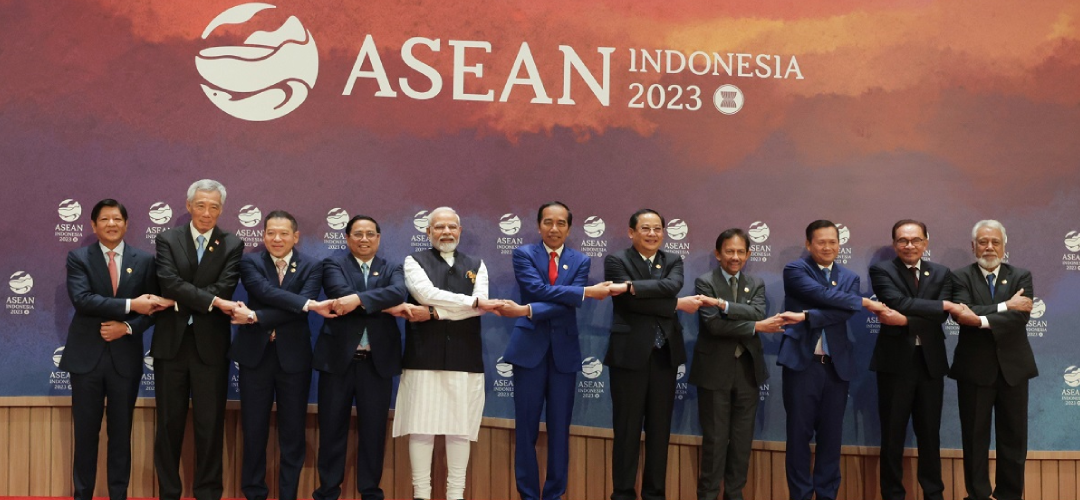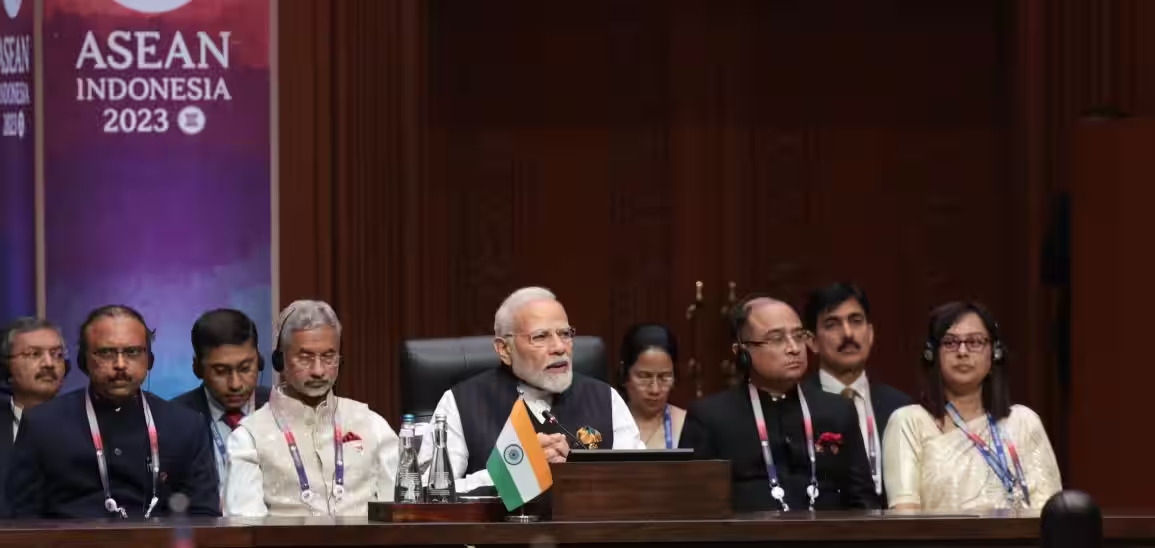ASEAN Summit 2023: Running Out of Steam?
September 23, 2023 | Expert Insights

The ASEAN Summit 2023, held in Jakarta, Indonesia, from September 5th to 7th, made significant progress in areas of economic cooperation, particularly in sectors such as sustainability and digitalization. However, the summit failed to make much progress on issues surrounding the South China Sea Code of Conduct (COC) and the humanitarian crisis in Myanmar.
The summit was attended by the leaders of all ten ASEAN member countries, as well as the leaders of the United States, China, Japan, South Korea, Australia, New Zealand, India, and Russia.
The ASEAN, comprising Brunei Darussalam, Myanmar, Cambodia, Indonesia, Lao, Malaysia, Philippines, Singapore, Thailand and Vietnam, collectively form the fourth largest trading partner of the U.S., representing a market with a GDP of more than $2.9 trillion.
Summit Highlights
During the ASEAN summit, leaders from the member nations addressed a wide range of critical issues, including the South China Sea, Myanmar's political crisis, the global economy, and climate change.
Regarding the South China Sea, ASEAN leaders reiterated their commitment to peacefully resolving disputes and upholding the Declaration on the Conduct of Parties in the South China Sea (DOC). However, they couldn't reach a consensus on a new code of conduct for the region.
The situation in Myanmar, which has been in turmoil since the military coup in February 2021, was a significant focus of discussion. ASEAN leaders expressed deep concern about Myanmar and called on the junta to halt violence, release political prisoners, and implement the ASEAN Five-Point Consensus, a plan to address the crisis.
In terms of the global economy, ASEAN leaders discussed challenges posed by the COVID-19 pandemic and the conflict in Ukraine. They pledged to collaborate on economic recovery and regional cooperation. An important outcome was the declaration on Strengthening Food Security and Nutrition in Response to Crises, aiming to enhance food security and nutrition amid crises like the pandemic and the Ukraine conflict.
Climate change also featured prominently on the agenda, with ASEAN leaders reaffirming their commitment to the Paris Agreement and emphasizing the need for urgent climate action.
A noteworthy achievement of the summit was the consensus reached between ASEAN leaders and their East Asian counterparts, including China, South Korea, and Japan, to develop an electric vehicle (EV) ecosystem. This agreement aims to boost the adoption of EVs and strengthen the supply chain in ASEAN, combining the technological expertise of East Asian nations, particularly in EV battery production, with ASEAN's resources like nickel, cost-effective labour, and a well-established vehicle assembly infrastructure. This accord represents a significant stride in ASEAN's economic integration and its pursuit of a more sustainable future. It underscores the region's capacity to cooperate on key economic matters, even amid geopolitical challenges.
Analysis
The 2023 ASEAN Summit faced significant hurdles in addressing the South China Sea dispute. China's release of a new territorial map, asserting sovereignty over larger portions of the South China Sea just a week prior to the summit, was met with swift rejection from Malaysia, India, and the Philippines. Notably, Chinese President Xi Jinping was absent from the summit.
This lack of progress on the South China Sea Code of Conduct (COC) represents a notable setback for ASEAN. The COC is a long-negotiated, legally binding framework aimed at governing activities in the region. However, China's unwavering stance on its South China Sea claims remains the primary obstacle to finalizing the COC, despite over a decade of negotiations.
Furthermore, the ASEAN Summit of 2023 did not yield any significant advancements in implementing the five-point consensus on Myanmar. This plan, designed to resolve the political crisis that has persisted since the military coup in February 2021, faced resistance from the Myanmar junta, which declined to adhere to the consensus. Unfortunately, the ASEAN forum could not reach a consensus on concrete steps to address this ongoing issue.
The standstill on both the South China Sea and the Myanmar crisis serves as a stark reminder of the geopolitical complexities confronting ASEAN. The region finds itself caught in the midst of the U.S.-China rivalry, with member states possessing diverse interests and priorities. This diversity makes it challenging for ASEAN to reach a unified stance on sensitive geopolitical matters.
The future outcomes of the South China Sea dispute and the Myanmar situation remain uncertain. However, it is evident that these issues will continue to pose substantial challenges for ASEAN in the years ahead. ASEAN leaders must persist in their collaborative efforts to address these matters and engage with the international community to garner support for their initiatives.
India View
For India, working out bilateral deals with individual ASEAN members has been more fruitful. It had a bilateral trade of USD 131.5 billion in 2022-23 with the bloc, accounting for about 11 per cent of India's global trade in 2022-23.
However, in the field of defence cooperation, India envisages maximum potential in its flourishing relationship with ASEAN members, seen under the shadow of the Chinese threat to member countries. The military partnership includes the supply of major platforms like warships and BRAHMOS missile systems to Vietnam and upgraded armoured vehicles to the Philippines. Many ASEAN nations have expressed keen interest in Indian defence products, especially the TEJAS combat aircraft and the Advanced Light Helicopter. New Delhi sees an opportunity in the growing anxiety against China and views South East Asia as a focal point for its Indo-Pacific strategy.
Assessment
- The ASEAN Summit 2023 was a mixed bag. On the one hand, ASEAN leaders were able to agree on a number of important issues, such as the ASEAN Blue Economy Framework and the ASEAN Declaration on Disability-Inclusive Development. On the other hand, they could not agree on a code of conduct for the South China Sea or a stronger response to the crisis in Myanmar. Clearly, they are still unable to get over their fears of a resurgent China whom they do not wish to confront openly.
- Indonesia's focus on its ASEAN chairmanship, which will run till the end of 2023, will gradually wane as the country prepares for its presidential election in 2024. Laos will take up the role of ASEAN chairmanship on January 1st, 2024, with a continued focus on economic issues, while discussions on geopolitical ones, such as South China Sea-related disputes, will probably be protracted.
- It is unlikely that the ASEAN Summit 2024 will make significant progress on the South China Sea and Myanmar issues. However, ASEAN members will continue to engage with each other and external partners to manage these challenges and promote regional cooperation. India, on its part, should continue to expand upon its relationship with the bloc and on a bilateral basis with individual nations like Vietnam, the Philippines and Indonesia, which have evinced great interest in Indian defence products and joint operational capablity.









Comments